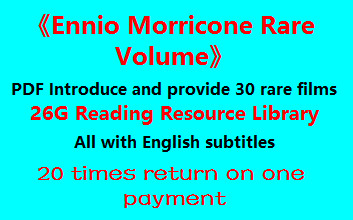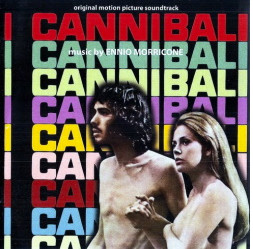I CANNIBALI (1970)
I Cannibali is a historical epic drama film directed by Liliana Cavani, based on the classic Greek tragedy of Antigone by the playwright Sophocles. The film stars Britt Ekland as Antigone, the daughter of King Oedipus and Queen Jocasta, who returns to her home city following the death of her father, ostensibly to stop a prophecy regarding the deaths of her brothers from coming to pass. However, when she arrives she finds that the throne has been seized by her uncle Creon, that her brothers are already dead, and that the streets of the city are full of dead bodies – bodies that Creon has ordered not to be buried as a warning to any potential rebels within the city. However, Antigone still tries to bury her brothers, sparking a confrontation with her uncle that has terrible consequences for all.
I Cannibali was the second of three collaborations between Cavani and Morricone, after Galileo in 1968. The score opens with a truly bizarre pop song, “Cannibal,” performed in English with proto punk-rock intensity by vocalist Don Powell. The lyrics are truly outrageous (“call me a cannibal, I won’t die… savage cannibal… crazy cannibal… pagan cannibal… I’ll just fly away on my sky blue horse”). It’s absolutely anachronistic for the film’s setting, and utterly bonkers in context, but it’s also completely rooted in that quintessential Morricone 70s sound, and so will likely appeal to devotees. There are several versions of the “Cannibal” melody later in the score.
The most prominent secondary theme is called “Song of Life,” and first appears a languid lounge-rock arrangement in the second cue featuring a prominent Hammond organ, and picks up the full choir of Alessandro Alessandrini’s Cantori Moderni, so much so that by the end it shares a lot of similarity with the superb ‘Abolição” cue from 1969’s Queimada. There are several restatements of this theme too, including a longer version for wordless vocals, and variations for electric piano and a more robust instrumental complement.
The rest of the score continues very much in this light rock/pop/lounge vein, with different melodic ideas emerging from similar arrangements comprising strings, organs, guitars, woodwinds, drum kit percussion, and dream-like vocals. Cues like “Senza Possiblitá d’Uscita,” the quixotic and flower-powery “Dove Sei, Dove Siete Voi,” and the groovy “Ricerca del Fratello” follow these stylistics, while the more upbeat and energetic “Scherzo Rondo” is a sort of mock-baroque piano piece enlivened with hi-hat cymbals and, eventually, wa-wa-wa vocals.
There have been a few releases of I Cannibali over the years. The one reviewed here is the one released on the Italian Digitmovies label in 2009, which expands the original CAM release to almost an hour of toe-tapping psychedelia. Quite what all this has to do with classical Greek tragedy and cannibalism is anyone’s guess, but it’s inexplicably entertaining, nonetheless.
Track Listing: 1. Cannibal (Vocal Versione Lunga) (3:56), 2. Song of Life (Versione Organo) (4:45), 3. Senza Possibilitá d’Uscita (2:10), 4. Dove Sei, Dove Siete Voi (2:17), 5. Scherzo Rondo (2:26), 6. Song of Life (2:51), 7. Ricerca del Fratello (1:51), 8. Marcia dei Can Can (1:56), 9. Song of Life (Vocal Versione Lunga) (4:48), 10. Dove Sei, Dove Siete Voi (Versione Organo) (2:17), 11. Scherzo Rondo (Versione 2) (2:17), 12. Song of Life (Versione Piano Elettrico) (2:51), 13. Marcia dei Can Can (Versione 2) (1:17), 14. Cannibal (Shake) (1:11), 15. Song of Life (Versione Strumenti) (4:48), 16. Dove Sei, Dove Siete Voi (Versione Oboe) (2:15), 17. Song of Life (Versione Organo 2) (2:51), 18. Cannibal (Versione Chitarra) (3:37). Digitmovies CDDM-128, 50 minutes 24 seconds.












